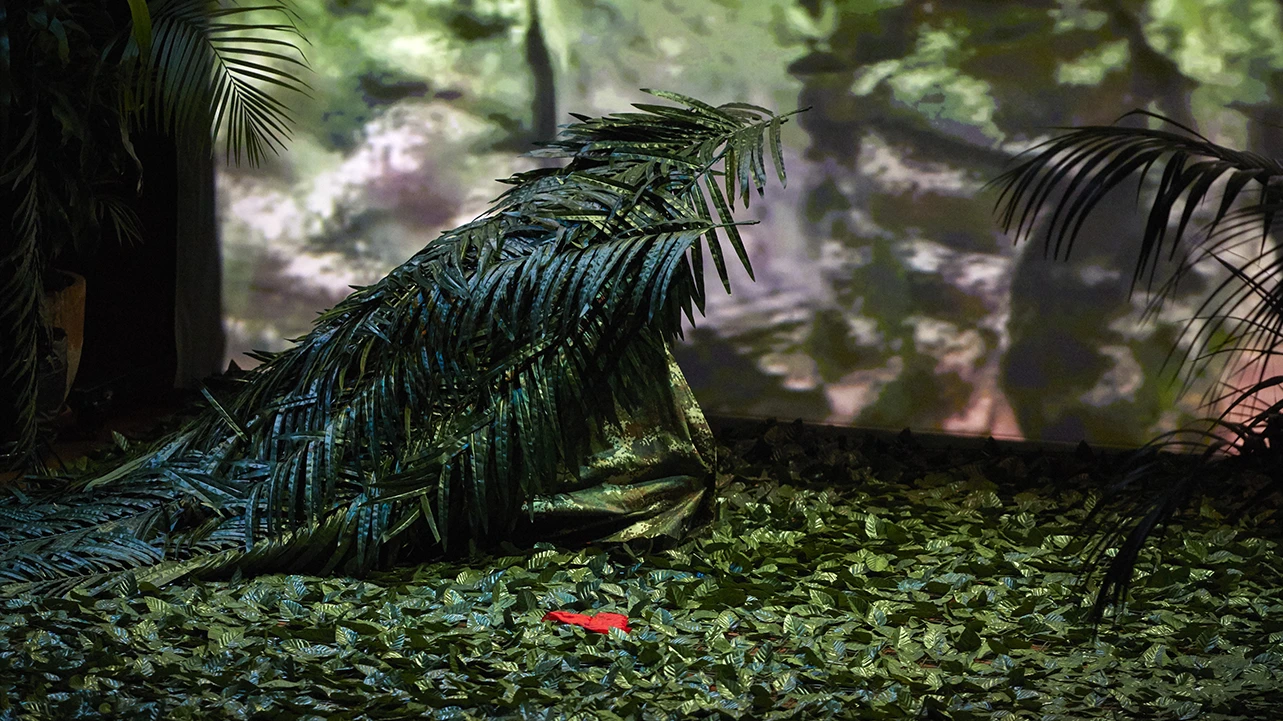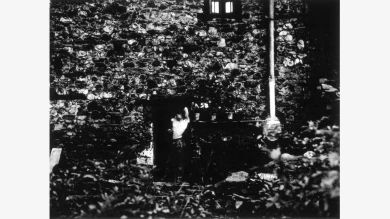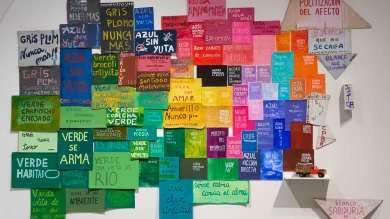The Territorial Re-Existences Lab
Encounter with Lavinia Fiori and Libia Grueso

Held on 22 Apr 2023
The Territorial Re-existences Lab is an encounter which, with Colombian researchers and activists Lavinia Fiori and Libia Grueso, and presented by Carmen Haro and moderated by Josimar Castillo and Elisa Fuenzalida from Redes por el clima (Networks for Climate), aims to pool the strategic visions, conceptual tools and narratives to deal with the climate crisis. These visions, tools and narratives are the outcome of a collective development carried out through previous participatory work in citizen labs in Casa San Cristóbal from the Montemadrid Foundation and the La Parcería cultural association.
The current situation of climate emergency necessitates not only a call for resistance, but also for listening to experiences of re-existence and the activation of past memories of collapse, plundering and extractivism. How is life re-born after these experiences and is it re-organised? What does “re-exist” mean exactly? How do we resist from re-existence? What are the narratives in the face of a common emergency? Who narrates, and from where and with which vocabulary? Which legal and communication tools have been developed from re-existence?
The major strand of previous labs involved processes of decision-making and horizontal participation linked to specific territories, analysing the ways in which they transform them and foster the creation of links between different organised communities and social movements through the crossover of three paradigmatic experiences: prior consultation in the Black Communities Process in Colombia — the right ethnic groups have to decide on legislative and administrative measures in their territories — and struggles for the defence of the Mar Menor in Murcia and Cañada Real Galiana between La Rioja and Ciudad Real. The encounter will divulge the results of these laboratories in order to create new strategies and activate existing practices in relation to the Earth and ourselves, acknowledging that there is not simply one environmental narrative but rather diverse experiences, images, memories and situated vocabularies.
[dropdown]
Josimar Castillo is a mediator in Redes por el clima with over seven years’ experience in implementing third-sector (NGO) projects and working with Colombian organisations in vulnerable communities. He studied Social Communication at the Cooperative University of Colombia and is currently studying an MA in Communication and Sociocultural Problems at Rey Juan Carlos University.
Lavinia Fiori is an anthropologist with an MA in Communication and over twenty years’ experience advocating social participation for sustainable development. As head of communication, she was part of the facilitating team in the process of participatory construction in Decree 1745 for the implementation of Law 70 of 1993 for Black communities in Colombia.
Elisa Fuenzalida is a researcher and mediator with Redes por el clima, the editor of the Arts of the Working Class publication, and an assistant curator on the Museo Reina Sofía’s Aníbal Quijano Chair. She has directed research projects that include El futuro era tu cuerpo and participates as a guest lecturer on the 2023 programme at Universitat der Künste in Berlin.
Libia Grueso is a social worker and a specialist in Environmental Education and Political Studies. She is also a co-founder of the Black Communities Process (PCN). In 2004, she was awarded the Goldman Environmental Prize, and is currently an advisor of Ethnic Affairs at the UN’s High Commissioner for Human Rights in Colombia.
Carmen Haro is a researcher and professor at Rey Juan Carlos University in Madrid and a coordinator at Redes por el clima. With a PhD in Communication and Social Sciences, in recent years she has promoted projects such as Agrolab, in collaboration with the Madrid Institute for Rural, Agrarian and Food Research and Development (IMIDRA) and the Community of Madrid, and the Ecosystems Project (2020–2021), with Intermediae Matadero, Medialab Prado and Madrid City Council, among others.
[/dropdown]
Coordinated by
Josimar Castillo, Elisa Fuenzalida and Carmen Haro
Organised by
Museo Reina Sofía and Redes por el clima
Inside the framework of
TIZ 9. Relational Ecologies
Participants
Participants
Más actividades

Institutional Decentralisation
Thursday, 21 May 2026 – 5:30pm
This series is organised by equipoMotor, a group of teenagers, young people and older people who have participated in the Museo Reina Sofía’s previous community education projects, and is structured around four themed blocks that pivot on the monstrous.
This fourth and final session centres on films that take the museum away from its axis and make it gaze from the edges. Pieces that work with that which is normally left out: peripheral territories, unpolished aesthetics, clumsy gestures full of intent. Instead of possessing an institutional lustre, here they are rough, precarious and strange in appearance, legitimate forms of making and showing culture. The idea is to think about what happens when central authority is displaced, when the ugly and the uncomfortable are not hidden, when they are recognised as part of the commons. Film that does not seek to be to one’s liking, but to open space and allow other ways of seeing and inhabiting the museum to enter stage.
![Tracey Rose, The Black Sun Black Star and Moon [La luna estrella negro y negro sol], 2014.](https://recursos.museoreinasofia.es/styles/small_landscape/public/Obra/AD07091_2.jpg.webp)
On Black Study: Towards a Black Poethics of Contamination
Monday 27, Tuesday 28 and Wednesday 29 of April, 2026 – 16:00 h
The seminar On Black Study: Towards a Black Poethics of Contamination proposes Black Study as a critical and methodological practice that has emerged in and against racial capitalism, colonial modernity and institutional capture. Framed through what the invited researcher and practitioner Ishy Pryce-Parchment terms a Black poethics of contamination, the seminar considers what it might mean to think Blackness (and therefore Black Study) as contagious, diffuse and spreadable matter. To do so, it enacts a constellation of diasporic methodologies and black aesthetic practices that harbor “contamination” -ideas that travel through texts, geographies, bodies and histories- as a method and as a condition.
If Blackness enters Western modernity from the position of the Middle Passage and its afterlives, it also names a condition from which alternative modes of being, knowing and relating are continually forged. From within this errant boundarylessness, Black creative-intellectual practice unfolds as what might be called a history of touches: transmissions, residues and socialities that unsettle the fantasy of pure or self-contained knowledge.
Situated within Black radical aesthetics, Black feminist theory and diasporic poetics, the seminar traces a genealogy of Black Study not as an object of analysis but as methodological propositions that continue to shape contemporary aesthetic and political life. Against mastery as the horizon of study, the group shifts attention from what we know to how we know. It foregrounds creative Black methodological practices—fahima ife’s anindex (via Fred Moten), Katherine McKittrick’s expansive use of the footnote, citation as relational and loving labour, the aesthetics of Black miscellanea, and Christina Sharpe’s practices of annotation—as procedures that disorganise dominant regimes of knowledge. In this sense, Black Study is approached not as a discrete academic field but as a feel for knowing and knowledge: a constellation of insurgent practices—reading, gathering, listening, annotating, refusing, world-making—that operate both within and beyond the university.
The study sessions propose to experiment with form in order to embrace how ‘black people have always used interdisciplinary methodologies to explain, explore, and story the world.’ Through engagements with thinkers and practitioners such as Katherine McKittrick, C.L.R. James, Sylvia Wynter, Christina Sharpe, Fred Moten, Tina Campt, Hilton Als, John Akomfrah, fahima ife and Dionne Brand, we ask: What might it mean to study together, incompletely and without recourse to individuation? How might aesthetic practice function as a poethical intervention in the ongoing work of what Sylvia Wynter calls the practice of doing humanness?

Intergenerationality
Thursday, 9 April 2026 – 5:30pm
This series is organised by equipoMotor, a group of teenagers, young people and older people who have participated in the Museo Reina Sofía’s previous community education projects, and is structured around four themed blocks that pivot on the monstrous.
The third session gazes at film as a place from which to dismantle the idea of one sole history and one sole time. From a decolonial and queer perspective, it explores films which break the straight line of past-present-future, which mix memories, slow progress and leave space for rhythms which customarily make no room for official accounts. Here the images open cracks through which bodies, voices and affects appear, disrupting archive and questioning who narrates, and from where and for whom. The proposal is at once simple and ambitious: use film to imagine other modes of remembering, belonging and projecting futures we have not yet been able to live.

Remedios Zafra
Thursday March 19, 2026 - 19:00 h
The José Luis Brea Chair, dedicated to reflecting on the image and the epistemology of visuality in contemporary culture, opens its program with an inaugural lecture by essayist and thinker Remedios Zafra.
“That the contemporary antifeminist upsurge is constructed as an anti-intellectual drive is no coincidence; the two feed into one another. To advance a reactionary discourse that defends inequality, it is necessary to challenge gender studies and gender-equality policies, but also to devalue the very foundations of knowledge in which these have been most intensely developed over recent decades—while also undermining their institutional support: universities, art and research centers, and academic culture.
Feminism has been deeply linked to the affirmation of the most committed humanist thought. Periods of enlightenment and moments of transition toward more just social forms—sustained by education—have been when feminist demands have emerged most strongly. Awareness and achievements in equality increase when education plays a leading social role; thus, devaluing intellectual work also contributes to harming feminism, and vice versa, insofar as the bond between knowledge and feminism is not only conceptual and historical, but also intimate and political.
Today, antifeminism is used globally as the symbolic adhesive of far-right movements, in parallel with the devaluation of forms of knowledge emerging from the university and from science—mistreated by hoaxes and disinformation on social networks and through the spectacularization of life mediated by screens. These are consequences bound up with the primacy of a scopic value that for some time has been denigrating thought and positioning what is most seen as what is most valuable within the normalized mediation of technology. This inertia coexists with techno-libertarian proclamations that reactivate a patriarchy that uses the resentment of many men as a seductive and cohesive force to preserve and inflame privileges in the new world as techno-scenario.
This lecture will address this epochal context, delving into the synchronicity of these upsurges through an additional parallel between forms of patriarchal domination and techno-labor domination. A parallel in which feminism and intellectual work are both being harmed, while also sending signals that in both lie emancipatory responses to today’s reactionary turns and the neutralization of critique. This consonance would also speak to how the perverse patriarchal basis that turns women into sustainers of their own subordination finds its equivalent in the encouraged self-exploitation of cultural workers; in the legitimation of affective capital and symbolic capital as sufficient forms of payment; in the blurring of boundaries between life and work and in domestic isolation; or in the pressure to please and comply as an extended patriarchal form—today linked to the feigned enthusiasm of precarious workers, but also to technological adulation. In response to possible resistance and intellectual action, patriarchy has associated feminists with a future foretold as unhappy for them, equating “thought and consciousness” with unhappiness—where these have in fact been (and continue to be) levers of autonomy and emancipation.”
— Remedios Zafra

27th Contemporary Art Conservation Conference
Wednesday, 4, and Thursday, 5 March 2026
The 27th Contemporary Art Conservation Conference, organised by the Museo Reina Sofía’s Department of Conservation and Restoration, with the sponsorship of the Mapfre Foundation, is held on 4 and 5 March 2026. This international encounter sets out to share and debate experience and research, open new channels of study and reflect on conservation and the professional practice of restorers.
This edition will be held with in-person and online attendance formats, occurring simultaneously, via twenty-minute interventions followed by a five-minute Q&A.
![Miguel Brieva, ilustración de la novela infantil Manuela y los Cakirukos (Reservoir Books, 2022) [izquierda] y Cibeles no conduzcas, 2023 [derecha]. Cortesía del artista](https://recursos.museoreinasofia.es/styles/small_landscape/public/Actividades/ecologias_del_deseo_utopico.jpg.webp)
![Ángel Alonso, Charbon [Carbón], 1964. Museo Reina Sofía](https://recursos.museoreinasofia.es/styles/small_landscape/public/Actividades/perspectivas_ecoambientales.jpg.webp)
![Alvin Langdon Coburn, The Coal Cart and the Tower [El carro de carbón y la torre], ca. 1911 / Copia póstuma, 2002, Museo Reina Sofía](https://recursos.museoreinasofia.es/styles/small_landscape/public/Actividades/la_imposible_transicion_energetica.jpg.webp)

